Related Research Articles

The rights of lesbian, gay, bisexual, and transgender (LGBT) people in the U.S. state of Utah have significantly evolved in the 21st century. Protective laws have become increasingly enacted since 2014, despite the state's reputation as socially conservative and highly religious. Utah's anti-sodomy law was invalidated in 2003 by Lawrence v. Texas, and fully repealed by the state legislature in 2019. Same-sex marriage has been legal since the state's ban was ruled unconstitutional by federal courts in 2014. In addition, statewide anti-discrimination laws now cover sexual orientation and gender identity in employment and housing, and the use of conversion therapy on minors is prohibited. In spite of this, there are still a few differences between the treatment of LGBT people and the rest of the population, and the rights of transgender youth are restricted.

Lesbian, gay, bisexual, and transgender (LGBT) rights in the United States are among the most advanced in the world, with public opinion and jurisprudence changing significantly since the late 1980s.
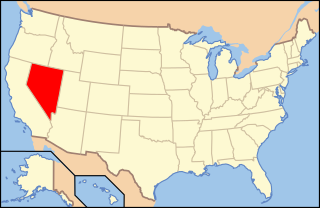
Lesbian, gay, bisexual, and transgender (LGBT) people in the U.S. state of Nevada enjoy the same rights as non-LGBT people. Same-sex marriage has been legal since October 8, 2014, due to the federal Ninth Circuit Court of Appeals ruling in Sevcik v. Sandoval. Same-sex couples may also enter a domestic partnership status that provides many of the same rights and responsibilities as marriage. However, domestic partners lack the same rights to medical coverage as their married counterparts and their parental rights are not as well defined. Same-sex couples are also allowed to adopt, and state law prohibits unfair discrimination on the basis of sexual orientation and gender identity, among other categories, in employment, housing and public accommodations. In addition, conversion therapy on minors is outlawed in the state.

Lesbian, gay, bisexual, and transgender (LGBT) people in the U.S. state of Wyoming may face some legal challenges not experienced by non-LGBT residents. Same-sex sexual activity has been legal in Wyoming since 1977, and same-sex marriage was legalized in the state in October 2014. Wyoming statutes do not address discrimination on the basis of sexual orientation and gender identity; however, the U.S. Supreme Court's ruling in Bostock v. Clayton County established that employment discrimination against LGBT people is illegal under federal law. In addition, the cities of Jackson, Casper, and Laramie have enacted ordinances outlawing discrimination in housing and public accommodations that cover sexual orientation and gender identity.
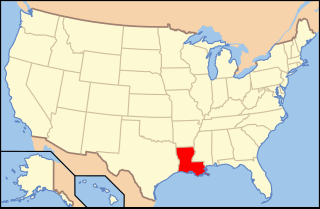
Lesbian, gay, bisexual, and transgender (LGBT) people in the U.S. state of Louisiana may face some legal challenges not experienced by non-LGBT residents. Same-sex sexual activity is legal in Louisiana as a result of the US Supreme Court decision in Lawrence v. Texas. Same-sex marriage has been recognized in the state since June 2015 as a result of the Supreme Court's decision in Obergefell v. Hodges.

Lesbian, gay, bisexual, and transgender (LGBT) people in the U.S. state of Ohio enjoy most of the same rights as non-LGBT people. Same-sex sexual activity has been legal in Ohio since 1974, and same-sex marriage has been legally recognized since June 2015 as a result of Obergefell v. Hodges. Ohio statutes do not address discrimination on account of sexual orientation and gender identity; however, the U.S. Supreme Court's ruling in Bostock v. Clayton County established that employment discrimination against LGBT people is illegal in 2020. In addition, a number of Ohio cities have passed anti-discrimination ordinances providing protections in housing and public accommodations. Conversion therapy is also banned in a number of cities. In December 2020, a federal judge invalidated a law banning sex changes on an individual's birth certificate within Ohio.

In the United States, lesbian, gay, bisexual, and transgender (LGBT) people have a long history, including vibrant subcultures and advocacy battles for social and religious acceptance and legal rights.

Vermont is seen as one of the most liberal states in the U.S. in regard to lesbian, gay, bisexual, and transgender (LGBT) rights, with most progress in jurisprudence having occurred in the late 20th and the early 21st centuries. Vermont was one of 37 U.S. states, along with the District of Columbia, that issued marriage licenses to same-sex couples prior to the landmark Supreme Court ruling of Obergefell v. Hodges, establishing equal marriage rights for same-sex couples nationwide.
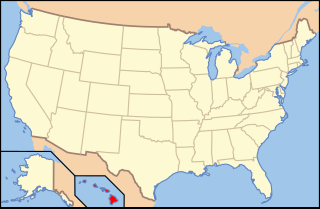
Lesbian, gay, bisexual, transgender, and queer (LGBTQ) people in the U.S. state of Hawaii enjoy the same rights as non-LGBTQ people. Same-sex sexual activity has been legal since 1973; Hawaii being one of the first six states to legalize it. In 1993, a ruling by the Hawaiʻi Supreme Court made Hawaii the first state to consider legalizing same-sex marriage. Following the approval of the Hawaii Marriage Equality Act in November 2013, same-sex couples have been allowed to marry on the islands. Additionally, Hawaii law prohibits discrimination on the basis of both sexual orientation and gender identity, and the use of conversion therapy on minors has been banned since July 2018. Gay and lesbian couples enjoy the same rights, benefits and treatment as opposite-sex couples, including the right to marry and adopt.
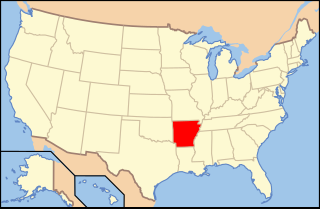
Lesbian, gay, bisexual, transgender, and queer (LGBTQ) people in the U.S. state of Arkansas face legal challenges not experienced by non-LGBTQ residents. Same-sex sexual activity is legal in Arkansas. Same-sex marriage became briefly legal through a court ruling on May 9, 2014, subject to court stays and appeals. In June 2015, the U.S. Supreme Court ruled in Obergefell v. Hodges that laws banning same-sex marriage are unconstitutional, legalizing same-sex marriage in the United States nationwide including in Arkansas. Nonetheless, discrimination on the basis of sexual orientation and gender identity was not banned in Arkansas until the Supreme Court banned it nationwide in Bostock v. Clayton County in 2020.
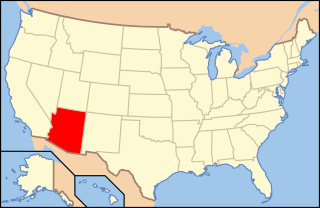
Lesbian, gay, bisexual, transgender, and queer (LGBTQ) people in the U.S. state of Arizona may face legal challenges not experienced by non-LGBTQ residents. Same-sex sexual activity is legal in Arizona, and same-sex couples are able to marry and adopt. Nevertheless, the state provides only limited protections against discrimination on the basis of sexual orientation and gender identity. Several cities, including Phoenix and Tucson, have enacted ordinances to protect LGBTQ people from unfair discrimination in employment, housing and public accommodations.
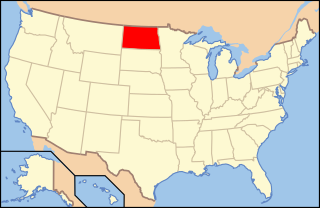
Lesbian, gay, bisexual, and transgender (LGBT) people in the U.S. state of North Dakota may face some legal challenges not experienced by non-LGBT residents. Same-sex sexual activity is legal in North Dakota, and same-sex couples and families headed by same-sex couples are eligible for all of the protections available to opposite-sex married couples; same-sex marriage has been legal since June 2015 as a result of Obergefell v. Hodges. State statutes do not address discrimination on account of sexual orientation or gender identity; however, the U.S. Supreme Court's ruling in Bostock v. Clayton County established that employment discrimination against LGBT people is illegal under federal law.
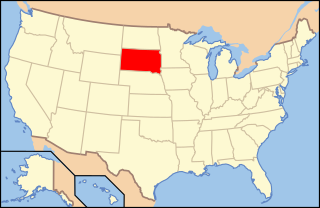
Lesbian, gay, bisexual, and transgender (LGBT) people in the U.S. state of South Dakota may face some legal challenges not experienced by non-LGBT residents. Same-sex sexual activity is legal in South Dakota, and same-sex marriages have been recognized since June 2015 as a result of Obergefell v. Hodges. State statutes do not address discrimination on account of sexual orientation or gender identity; however, the U.S. Supreme Court's ruling in Bostock v. Clayton County established that employment discrimination against LGBT people is illegal under federal law.

Lesbian, gay, bisexual, and transgender (LGBT) people in the U.S. state of Nebraska may face some legal challenges not experienced by non-LGBT residents. Same-sex sexual activity is legal in Nebraska, and same-sex marriage has been recognized since June 2015 as a result of Obergefell v. Hodges. The state prohibits discrimination on account of sexual orientation and gender identity in employment and housing following the U.S. Supreme Court's ruling in Bostock v. Clayton County and a subsequent decision of the Nebraska Equal Opportunity Commission. In addition, the state's largest city, Omaha, has enacted protections in public accommodations.

Lesbian, gay, bisexual, transgender, and queer (LGBTQ) people in the U.S. state of Kentucky still face some legal challenges not experienced by other people. Same-sex sexual activity in Kentucky has been legally permitted since 1992, although the state legislature has not repealed its sodomy statute for same-sex couples. Same-sex marriage is legal in Kentucky under the U.S. Supreme Court ruling in Obergefell v. Hodges. The decision, which struck down Kentucky's statutory and constitutional bans on same-sex marriages and all other same-sex marriage bans elsewhere in the country, was handed down on June 26, 2015.

Lesbian, gay, bisexual, transgender, and queer (LGBTQ) people in the U.S. state of Kansas have federal protections, but many face some legal challenges on the state level that are not experienced by non-LGBTQ residents. Same-sex sexual activity is legal in Kansas under the US Supreme Court case Lawrence v. Texas, although the state legislature has not repealed its sodomy laws that only apply to same-sex sexual acts. The state has prohibited discrimination on the basis of sexual orientation and gender identity in employment, housing and public accommodations since 2020. Proposed bills restricting preferred gender identity on legal documents, bans on transgender people in women's sports, bathroom use restrictions, among other bills were vetoed numerous times by Democratic Governor Laura Kelly since 2021. However, many of Kelly's vetoes were overridden by the Republican supermajority in the Kansas legislature and became law.

Lesbian, gay, bisexual, and transgender (LGBT) people in the U.S. state of Mississippi face legal challenges and discrimination not experienced by non-LGBT residents. LGBT rights in Mississippi are limited in comparison to other states. Same-sex sexual activity is legal in Mississippi as a result of the U.S. Supreme Court decision in Lawrence v. Texas. Same-sex marriage has been recognized since June 2015 in accordance with the Supreme Court's decision in Obergefell v. Hodges. State statutes do not address discrimination on the basis of sexual orientation and gender identity; however, the U.S. Supreme Court's ruling in Bostock v. Clayton County established that employment discrimination against LGBT people is illegal under federal law. The state capital Jackson and a number of other cities provide protections in housing and public accommodations as well.

In the U.S. Virgin Islands, Lesbian, gay, bisexual, and transgender (LGBT) rights have evolved substantially in recent years. Same-sex sexual activity has been legal since 1985. The region also provides explicit legal protections against discrimination for LGBT residents since December 2022. Following the Supreme Court's ruling in Obergefell v. Hodges on June 26, 2015, which found the denial of marriage rights to same-sex couples unconstitutional, same-sex marriage became legal in the islands.
The state of North Dakota has improved in its treatment of lesbian, gay, bisexual and transgender residents in the late 1990s and into the 21st Century, when the LGBT community began to openly establish events, organizations and outlets for fellow LGBT residents and allies, and increase in political and community awareness.
South Dakota House Bill 1008, also known as House Bill 1008, HB 1008, and the Bathroom Bill, was a bill passed by the South Dakota Legislature in 2016 and vetoed by Governor of South Dakota Dennis Daugaard. The purpose of the bill was to restrict bathroom and locker room use by transgender students to facilities that matched their sex assigned at birth, not their gender identity. It was the first such bathroom bill to be passed in a state legislature in the U.S. and sparked a chain of similar bills across the nation. HB 1008 was opposed by several LGBT rights organizations, such as the HRC, GLSEN, and ACLU.
References
- ↑ "Two-Spirit People" (PDF). Bureau of Land Management. Bureau of Land Management. Retrieved 31 May 2016.
- 1 2 3 4 Painter, George. "The History of Sodomy Laws in the United States: South Dakota". Sodomy Laws. GLAPN. Retrieved 31 May 2016.
- ↑ "State v. Whitmarsh". Case Briefs. Casebriefs LLC. Retrieved 31 May 2016.
- ↑ Rosen, Rebecca J (February 26, 2014). "A Glimpse Into 1970s Gay Activism". The Atlantic. The Atlantic Monthly Group. Retrieved 31 May 2016.
- ↑ Bray, Robert (February 22, 1995). "The Birth of a Gay, Lesbian, Bisexual Movement in South Dakota". National Gay & Lesbian Task Force. Retrieved 31 May 2016.
- ↑ "Key Ballot Measures". CNN. CNN. Retrieved 31 May 2016.
- ↑ Reese, Phil. "2012 proving busy year for Victory Fund". Washington Blade. Brown, Naff, Pitts Omnimedia. Retrieved 31 May 2016.
- ↑ "First same-sex marriage license issued in South Dakota". Argus Leader. Gannett Company. June 26, 2015. Retrieved 3 June 2016.
- ↑ Holland, Jim; Feldman, Scott (June 27, 2015). "Rapid City women first to obtain same-sex marriage license, marry in South Dakota". Rapid City Journal. Rapid City Journal. Retrieved 3 June 2016.
- ↑ Bill, Kirkos (February 25, 2016). "South Dakota governor considers transgender restroom bill". CNN. CNN. Retrieved 31 May 2016.
- ↑ "House Bill 1008". South Dakota South Dakota Legislature Legislative Research Council. South Dakota Legislature. Retrieved 31 May 2016.
- ↑ "VICTORY! Protect Students from Anti-Transgender Bill". ACLU Action. ACLU. Retrieved 31 May 2016.
- ↑ "80,000 Reasons to Veto: South Dakota Gov. Daugaard Must Block Vile Legislation Attacking Transgender". Human Rights Campaign . February 23, 2016. Retrieved 31 May 2016.
- ↑ "GLSEN Calls on South Dakota Gov. Dennis Daugaard to Veto Harmful HB 1008". GLSEN. GLSEN. Retrieved 31 May 2016.
- ↑ Matzen, Morgan (October 23, 2023). "Transformation Project opens Prism Community Center, first LGBTQ+ Center in South Dakota". Sioux Falls Argus Leader . Retrieved March 10, 2024.